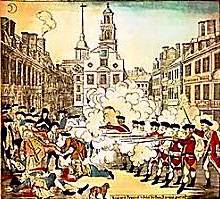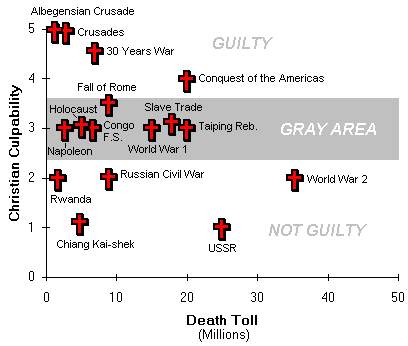
Christianity?
or
Gun Control

 |
Christianity? |
|
or |
||
Gun Control |
 |
Is that a stupid question or what?
The only reason I even bring it up is that I've discovered that the opponents of these two ideas have been going around accusing them of causing the same number of deaths: fifty-six million.
Why fifty-six million? Mere coincidence? Well, the precise calculations follow, but if I were of a more cynical bent, I might suggest that they just made it all up to prove a point. After all, 56 million is without a doubt the perfect random number. Since a million doesn't mean much anymore, you'll want to crank it up the next level and accuse your enemies of something in the ten millions. Of course, it would be even better to accuse them of a hundred million, but usually, that's out of reach. A number as high as that needs a lot of buttressing, so you'll have to settle for a number a tad lower and lot more accessible. Fortunately, if you can push your number up over the halfway mark, you can imply a hundred million without actually having it. Anything over 50 million will do. Well, truthfully, 51 isn't enough. Your first instinct upon seeing 51 is to round it down to 50, so you need to tack on a second digit large enough to resist the rounding-down. You need to push it at least as close to 60 as to 50 -- let's say 55. Of course, numbers ending in 0s and 5s always look like ballpark guesstimates, so let's add 1 to it, and it'll look more precise.
We see now that 56 million is the lowest number that implies both accuracy and a hundred. As I said, the perfect random number.
If we're being cynical.
But since we're not being cynical, let's take the accusations at face value and see how the numbers add up. After all, comparative genocide is a hobby of mine.
 |
There's an old saying: "The road to Hell is paved with good intentions", so wouldn't it be really ironic if a law created with the purpose of cutting back on the number of murders actually had the opposite effect? Of course, there's another old saying: "Yew-juice is sovereign against snake-bite", which goes to show you that sometimes old sayings are just plain stupid. Sometimes good intentions turn out just fine, and sometimes laws don't have ironic outcomes. But among the advocates of irony, the leading cause of 56 million needless deaths would seem to be gun control. Here's an account ledger that is reposted at several sites:
|
Well, right off the bat I can see that whoever compiled this tally has a different definition of defenseless than I do. I myself wouldn't declare the largest military machine on the planet "unable to defend itself", but by adding 20 million from the Soviet Union, this list does. After all, Stalin's most infamous terror fell heavily on the Soviet Army, culling tens of thousand of officers, and executing three out of five marshals, 15 out of 16 army commanders, 60 out of 67 corps commanders and 136 out of 199 division commanders. In one bloody year, the majority of the officer corps was led away quietly and shot. It may be one of life's great mysteries as to why the Red Army allowed itself to be gutted that way, but obviously, lack of firepower can't be the reason.
Just a few steps down, we can trim another 20 million from our total. Take a look at China, 1935. Picture, if you will, a long, peaceful line of naive little natives queueing up to dump their guns into an industrial smelter, while off to the side, a bureaucrat with a clipboard checks their names off the list. That's the image this list would like to create. The problem is, in 1935 China was in the midst of the Age of Warlords. Even if you know nothing about Chinese history, just the name "Age of Warlords" should tip you off. It was a pistolpacker's paradise, a lawless Wild West where all power flowed from the barrel of a gun.
But it's not just the ready availability of guns in China that contradicts the Big Tally. No, it's just as important what everyone was doing with all those guns -- fighting for supremacy, fighting against the Communists, fighting the Japanese. In other words, gun control or not, everyone who had a side to take had already taken sides. Everyone who wanted a gun already had a gun. The enemies of the state who were killed after 1949 weren't defenseless; they were just plain beaten.
This is what I call the Cold-Dead-Hands Test. If the only way to get someone's gun is to pry it from their cold, dead hands (literally or figuratively), that's not gun control. When Grant disarmed the Confederates at Appomattox, that wasn't gun control; that was taking prisoners. When the Soviets disarmed the remnants of the German 6th Army at Stalingrad, that wasn't gun control either. Mao didn't come to power in China by tricking the populace into surrendering their arms. He pummeled his well-armed opponents in a stand-up fight. There's a big difference between unable to fight back, and fighting back but losing.
It's just as hard to label the Cambodians defenseless when you remember that they had just spent five years and a half million lives trying to stop the Khmer Rouge. It's also hard to call the Guatemalans defenseless when it took a 30-year civil war to rack up their body count. Even most of the victims of Hitler went down kicking and screaming. The majority of the Jews and Gypsies were hunted down in countries like Poland and Russia that had been overrun in open battle, and if they were lacking guns, it certainly wasn't German laws that created the situation.
Frankly, this list is a pitifully weak argument against gun control, simply because most of the victims listed here did fight back. In fact, if there's a real lesson to be learned from this roster of oppressions, it's that sometimes a heavily armed and determined opposition is just swept up and crushed -- guns or no guns.
 |
Another paving crew on the road to Hell would seem to be your fanatical Christians. Here you've got an ideology that's just brimming with Good Intentions. It blesses the meek, the peacemakers, the poor in spirit, and then ironically slaughters them by the millions if they decline to be blessed. In fact, in The Rationalist's Manual (1897), M. D. Aletheia ironically calculates that "The Fruits of Christianism" have actually been 56 million deaths:
|
Of course, a lot of these numbers are just plain wrong. Most modern scholars would put the number of witches killed in the tens of thousands -- maybe even in the hundreds of thousands -- but certainly not in the millions. This author also seems to be a bit generous in assigning numbers to the Saxons and Arians, and I can't for the life of me find out what "the Carthaginian struggle" is, so I can't confirm or deny whether a million is plausible; however, the validity of the numbers is probably not the principle argument against this list.
The customary way of weaseling out of accusations of this sort is to point out that a real Christian would never do something like this, so none of these horrors were committed by real Christians. Of course, anyone who pulls this sort of argument should be slapped with a fish. It's utterly meaningless. You can easily apply it any situation you want -- a real man would never abandon his family; a real Communist would never suppress dissent; a real American would never start a war without a good reason, that drunkard is no son of mine -- and pretty soon, we've got a world full of horrible things that no one at all is responsible for.
Secondly, this argument is wrong because, well, the Bible says so. If you poke around a little, you easily find revered holy men launching wars of extermination (Numbers 31, Joshua 6, 8 and 11), sending death squads against religious dissidents (Exodus 32, 1 Kings 18, ) and generally behaving every bit as badly as Pinochet or Papa Doc. Even if good Christians try to ignore these bad bits of the Bible, evil Christians can still find plenty of encouragement for their misdeeds in holy scripture. [n.1]
However, if we're going to honestly assess the amount of misery inflicted on the world in the name of Christianity, we probably should distinguish between Christianity (the religion) and Christendom (Western civilization). For instance, the First World War was fought by good Christian monarchs -- God, after all, was the first word in the British, Austrian and Russian national anthems [n.3]-- but it's hard to see any religious motivation at work here. With Italy, Britain and Russia fighting against Austria, Germany and Bulgaria, you find Catholic, Protestant and Orthodox nations on both sides of the conflicts, not one denomination allied against another. If Christianity was somehow the cause of the war, then it was working at a subtle, subcutaneous level; however, without an overt religious conflict, we can't easily say whether they were so nasty because of their Christianity or in spite of it.
My way of analyzing these subtleties is to create an index of Christian culpability based on five questions. Assign one point for yes, no points for no, and half a point for sort of.
So, how do the major atrocities of Christendom score on this scale?
Obviously, the Crusades score yes across the board. The Thirty Years War easily scores 4 points as a brutal war of Protestants and Catholics for the domination of Germany, but it only gets half-credit on Question 4, because French intervention on the Protestant side late in the war blurred the lines.
The two major colonial brutalities, slavery and the American conquest, score yes on the first three questions and no on Question 4, but Question 5 is iffier. Was the proclaimed intention to Christianize the heathens a real motivation, or just a cover story? The missionaries pushing into the Americas were a mixed bag -- some good, some bad -- but even the good ones tended to legitimize the Conquest, and therefore count as willing participants. I would therefore give a full yes to the missionary participation in the conquest of the Americas, but shrug off the religious claims of the slavers. Granted, the major churches did nothing to stop the buying and selling of people, but when a belated effort at abolition arose, the first voices came from sects at the fringes of Christianity, which may balance the scales.
Most of the major players in the Fall of Rome were Christians, and the split between the Catholic and Arian varieties added fuel to the fire in the battles between tribes, but I hesitate to give a full yes to Question 2, because Constantine's switch from paganism to Christianity had only occurred a century earlier.
As I said earlier, the First World War is a good example of Christendom running amok without religious motivation, and thus earns yes on the first three questions, and no on the last two. The Napoleonic Wars fall into the same category. Even though Napoleon personally seems to have been a cynical Deist, he restored Catholicism as the state religion after the Revolution had deposed it.
Hitler, like Napoleon, seems to have been a Deist in private and a Catholic in public. [n.2] Whatever Hitler's long-term plans for Christianity may have been, he treated it more gently and with more respect than he did Communism, Judaism or homosexuality. The majority of his followers probably considered themselves to be Christians fighting against godless Communism. Therefore, in assigning blame for the Second World War (European Theater), I'd answer yes to Questions 1 and 2, but, fortunately for the reputation of Christianity, the Nazi high command had too many occult and neo-pagan Teutonic notions to pigeonhole into the Christian mainstream. Question 3 gets a no.
The Holocaust, however, is a special case. It still rates the two points assigned to the secular horrors of the Nazis, but because it was the culmination of centuries of Christian anti-Semitism, Christianity easily earns an extra point from Question 5. Because of the loopy racial theories that the Nazis used to support their atrocities, we probably can't say that the Holocaust was mostly religious in origin, but since the only real difference between the Jews and the rest of Europe is religion, we have to at least give religion partial credit.
Another event that gets a no to Question 3 is the Taiping Rebellion, a messianic uprising of Chinese Jesus worshippers that swept through the Manchu Empire in the 1850s and 60s. Does Christianity have some explaining to do here? Were the Taiping rebels even Christian? The fact that winners write the history books means that the Taipings are usually treated as poor deluded peasants following a madman's hallucinations, but when you get right down to it, maybe that's how all religions begin. If they had won, they might today be considered every bit as Christian as the Mormons (i.e. "mostly, sort of")
Another troublemaking convert who deserves consideration is Chiang Kai-shek, strongman of China from 1927 to 1949. Because he belonged to a small (but influential) clique of Christians in a much larger non-Christian power structure, I assign him only half points for Questions 1 and 3, and nothing for the rest.
The Russian Civil War doesn't even get the full three points allotted to your basic secular European War because half the participants were sworn Atheists. The Atheist victory generally absolves Christianity of guilt in the subsequent history of Russia; however, it's probably fair to at least ask whether Russia's Christian heritage led in some way to Soviet brutality. How much influence did Stalin's seminary training have in the style of his tyranny? Did Russia's history of divinely ordained autocrats assist the Communist consolidation of power? For these reasons, the Soviet Union gets one point of Christian guilt from Question 2.
Now all we have to do is plot the score against the most likely death toll, and we've got a visual aid:

Now doesn't this make a lot more sense than simply listing accusations? This way, if we going to blame or absolve Christianity for the First World War (Level 3 on the culpability scale), then we have to equally blame or absolve Islam for the 1980-88 Iran-Iraq War, because it too would rank as a Level 3 on an equivalent scale of Moslem culpability. Similarly, whether you blame/absolve atheism for purely political reppression in the USSR (Level 3) should follow the same criteria that you use in blaming/absolving Christianity in the Congo Free State.
At this point, you're probably asking yourself, "But does it matter?"
Well, yeah. I think it does. Ideologies have consequences. They need to be held accountable when they encourage violence against the enemy. If a religion fails to inspire mercy, maybe it needs to be fixed. Or, as someone once said, "Why do you look at the speck of sawdust in your brother's eye and pay no attention to the plank in your own eye?"
[n.1]
... misdeeds in holy scripture ...
And I'm not going to let you get away with dismissing these examples as obsolete Old Testament stuff. If it's not Holy Scripture, then why doesn't someone edit it out? Otherwise, how are we supposed to know the difference between Moses the Lawgiver and Moses the Thug? If the Old Testament doesn't count, then why do we have to post the Ten Commandments in our schools? In fact, while we're on the subject, since the Old Testament isn't valid anymore, why don't you grab your Bible now and just rip those pages right out of it. I'll wait here for you.
[Back]
[n.2]
... a Deist in private and a Catholic in public ...
I wouldn't want to give the impression that only Bad People hide their irreligiosity from the general public. Abraham Lincoln also seemed to have been a public Christian and a private Deist.
[n.3]
... good Christian monarchs ...
From The Tsar's Last Armada by Constantine Pleshakov: "[Kaiser] Wilhelm was sincere about his hatred of the Japanese. He detested the 'pagan' East and maintained that it was the duty of every Christian to oppose the 'yellow peril'.... Nicky [Tsar Nicholas] was sympathetic to this... He was a very fundamentalist Christian himself. " (p.18-19)
[Back]
Last updated 25 December 2003
Copyright © 2003 Matthew White